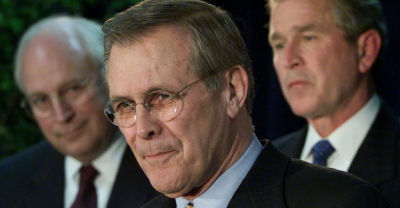Rumsfeld Remembered as ‘Complex,’ ‘Energetic’—Not as Killer of Multitudes

All Global Research articles can be read in 51 languages by activating the “Translate Website” drop down menu on the top banner of our home page (Desktop version).
Visit and follow us on Instagram at @crg_globalresearch.
***
One thing you won’t find in corporate media obituaries of Donald Rumsfeld is any estimate of how many people died in the wars he was in charge of launching.
You do see occasional references to the US troops he sent to their deaths—as in the AP‘s obit (6/30/21):
Defiant to the end, Rumsfeld expressed no regrets in his farewell ceremony, at which point the US death toll in Iraq had surpassed 2,900. The count would eventually exceed 4,400.
And in the New York Times (6/30/21):
Mr. Rumsfeld, more than four years out of office, still expressed no regrets over the decision to invade Iraq, which had cost the United States $700 billion and 4,400 American lives.
But the Afghan and Iraqi lives lost as the result of the wars Rumsfeld managed—which by the most careful estimates outnumbered the US dead by a factor of a hundred or more (PLOS Medicine, 10/15/13; Lancet, 10/12/06)—simply go unmentioned. This, of course, greatly facilitates the job of the obituary writer, who is required to present every deceased member of the Washington establishment as a complicated, ultimately lovable character, regardless of the scale of their crimes.
Or as the Washington Post (6/30/21) put it: “Mr. Rumsfeld was more complex and paradoxical than the public caricature of him as a pugnacious, inflexible villain would suggest.”
‘Handling’ Iraq
Of course, a catastrophe on the scale of the Iraq War can’t be presented as an unvarnished success for Rumsfeld. But neither can it be presented as a criminal act of aggression, because that would indict Rumsfeld’s co-conspirators, many of whom are still alive and plenty of whom still have jobs either in the federal government or the nation’s premier media outlets. (During that war, many professional journalists covered Rumsfeld with an enthusiasm that approached idol worship, referring to him as “America’s new rock star,” a “father figure,” a “sex symbol” and “America’s stud”—Extra!, 3–4/02).
So you need a strategy for criticizing Rumsfeld without directly addressing the fact that he supervised wars of aggression that killed multitudes of people. Perhaps it was his management style, as the Post suggested when it reported that “his handling of the Iraq War eventually led to his downfall.”
Rumsfeld “failed to set a clear policy for the treatment of prisoners,” the Post‘s Bradley Graham wrote, which is a peculiar way of saying that Rumsfeld specifically approvedmost of the forms of torture used at Guantánamo and Abu Ghraib, including the use of stress positions, sleep deprivation, sensory deprivation, isolation, sexual humiliation and threats from dogs—along with “mild, non-injurious” beatings.
He could have been more of a people person, the Post intimated:
While capable of great charm and generosity, he often seemed to undercut himself with a confrontational, gruff and belittling manner that many found offensive.
Or, perhaps, Rumsfeld was really the victim and not the perpetrator of the Iraq War—as the AP suggested with its original headline, “Donald Rumsfeld, a Cunning Leader Undermined by the Iraq War.” AP later switched that to “…Who Oversaw a Ruinous Iraq War,” but the attempt to evoke pity for Rumsfeld is still there is reporter Robert Burns’ lead:
Calling Donald H. Rumsfeld energetic was like calling the Pacific wide. When others would rest, he would run. While others sat, he stood. But try as he might, at the pinnacle of his career as Defense secretary he could not outmaneuver the ruinous politics of the Iraq War.
‘Success’ in Afghanistan
Another tactic employed by AP was to “balance” the problematic Iraq experience with the supposed bright spots of Rumsfeld’s career—notably the invasion of Afghanistan:
US forces invaded Afghanistan on October 7, and with Rumsfeld at the Pentagon helm the Taliban regime was toppled within weeks…. Within months of that success, President George W. Bush’s attention shifted to Iraq, which played no role in the September 11 attacks.
The Washington Post likewise presented Afghanistan as an example of Rumsfeld’s characteristic brilliance:
Mr. Rumsfeld was initially hailed for leading the US military to war in the wake of the September 11, 2001, terrorist attacks…. In the wake of the Afghan invasion, Mr. Rumsfeld hoped to devise a similarly innovative war plan for toppling Saddam Hussein’s regime in Iraq.
Reading these tributes, you could almost forget that in Afghanistan Rumsfeld launched the US’s longest overseas war, one that has killed nearly a quarter of a million people (including 70,000 civilians) without achieving any of the democracy-building, rights-protecting goals that were used to sell the occupation—or even completing its original task of capturing Al Qaeda’s Osama bin Laden. (He was instead assassinated years later in Pakistan.)
Describing Rumsfeld’s arrival in Washington, the Times‘ Robert McFadden wrote:
He seemed like an All-American who had stepped off the Wheaties box—a strikingly handsome Midwesterner radiating confidence, taking on big tasks and doing everything well.
Could any war criminal ask to be remembered more fondly?
*
Note to readers: Please click the share buttons above or below. Follow us on Instagram, @crg_globalresearch. Forward this article to your email lists. Crosspost on your blog site, internet forums. etc.
Jim Naureckas is the editor of FAIR.org, and has edited FAIR’s print publication Extra! since 1990. He is the co-author of The Way Things Aren’t: Rush Limbaugh’s Reign of Error, and co-editor of The FAIR Reader. He was an investigative reporter for In These Times and managing editor of the Washington Report on the Hemisphere. Born in Libertyville, Illinois, he has a poli sci degree from Stanford. Since 1997 he has been married to Janine Jackson, FAIR’s program director.
Featured image is from FAIR

